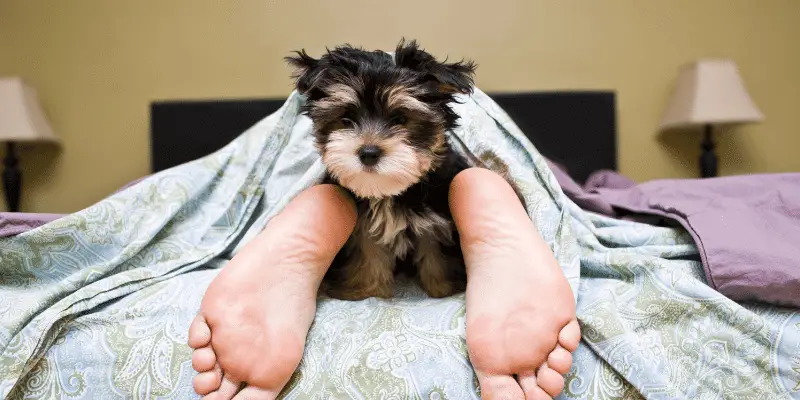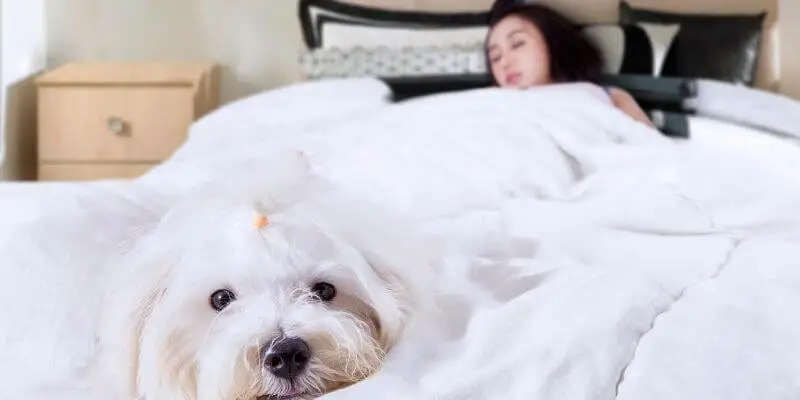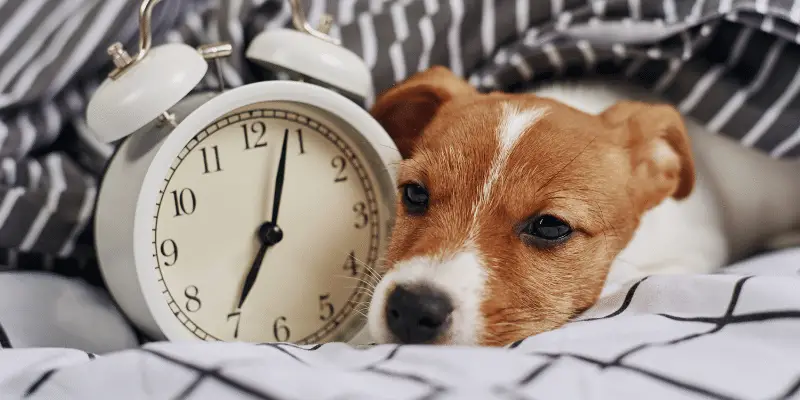
Should you let your puppy sleep in your bed?
- Written by Joshua Gordon
- Last updated

Should you let your puppy sleep in your bed?
A common decision by many dog owners is to start their pup sleeping in its own crate, providing them with a safe area and giving the owner the option to let them in the bed later once they have been toilet and crate trained.
However, there is no right or wrong answer, only what feels comfortable and safe for you and your pup.
In this article
Ask the Vet – Should I let my puppy sleep in my bed?

What are the benefits of letting your puppy sleep in your bed?
There are several suggested benefits to letting your puppy sleep in your bed:
Humans have been doing it for centuries
It’s recognized in some cultures that humans and dogs have been ‘co-sleeping’ with each other for centuries and is a tried and tested way to bond with your puppy from the beginning.It can ease anxiety for both you and your dog
Co-sleeping can make your puppy feel safe and secure when they’re close to you, providing them comfort knowing that you’ll be there to protect them. This feeling can work both ways, research journals from MDPI show a dog’s presence can help you relax and ease anxiety by increasing the flow of oxytocin, the ‘love’ chemical.It can help regulate your dog’s body temperature at night
A dog sleeping next to you can help regulate their body temperature – particularly if they’re a small breed, it will also provide you with a furry alternative to a hot water bottle.Your dog can adopt your sleep cycle
According to sleep research dogs are diurnal (active during the day and then sleep at night) and adapt to human rhythms. A 2017 study conducted by the Mayo Clinic’s Center for Sleep Medicine found that of pet owners allowing their pet to sleep in the bedroom, 41% perceived their pets as “unobtrusive or even beneficial to sleep”.

What are the negatives of letting your puppy sleep in your bed?
There are several suggested negatives to letting your puppy sleep in your bed:
Puppy safety:
Your bed may not be the safest place for a puppy to sleep at night. A puppy might be;
• Crushed if you were to accidentally roll over on them during the night.
• Labour their breathing with heavy blankets.
• Typically small puppies may also have trouble jumping off the bed or fall, causing severe injuries.It can make it difficult to crate train your puppy later down the line:
Setting a standard that your bed is the puppy’s safe sleeping place can make it difficult to train them to sleep in their own bed or crate later down the line if you change your mind. You may want to allow for that flexibility on occasions you need your dog to stay with friends and family.
If you skip bedtime crate training, it can deny your puppy some much-needed space. Puppies that don’t learn to have breaks from their owners, can often develop destructive behaviors and separation anxiety if you do leave them in their crate.
Dogs are diurnal animals that naturally get tired at night, this is an ideal time for them to learn to be comfortable with being alone for periods of time in the crate.

It could increase separation anxiety within your puppy:
A puppy sleeping in its owner’s bed at night may create or intensify existing problems with separation anxiety in the dog.
It’s been linked with dog behavioral issues:
There are links between co-sleeping and behavior problems in dogs such as attachment-led anxiety. However, it’s not known whether co-sleeping is the source of the problem or a pre-existing issue that leads to the co-sleeping arrangement in the first place.
If you do experience signs of aggression or find any other behavioral issues being heightened in your dog from co-sleeping, provide them with their own sleeping space like a crate and consult your Vet or a professional trainer.
Dogs and humans sleep cycles differ and this can affect the quality of sleep:
Like humans, dogs are diurnal, which means that they get a majority of their sleep at night. Where dogs differ from humans is that they sleep in multiple sessions in a 24 hour period (polyphasic sleeping).
The average sleep time for a dog is 45 minutes, whereas humans often sleep for 6-9 hours at a time. This could cause the owner to receive broken sleep throughout the night if they are awoken. One reason dogs do this is their instinctive behavior to stay alert for sounds during the night, which may make them lighter sleepers than their humans.
Puppy fur and dander could cause aggravated allergy symptoms:
If you are allergic to dog fur or pet dander (Dandruff), your puppy sleeping on or near your pillow could aggravate your sensitivity and cause more severe reactions.Puppies may experience incontinence during sleep
Your puppy may not have fully learned to control their bladder sufficiently. Minor leakage as the pup sleeps can be spread around your bed and pillow. This will result in dirty, smelly sheets that need more frequent cleanings to stay safe and smelling fresh.
Should I let my puppy sleep in my children’s bed?
There are many associated benefits of children growing up with dogs such as the reduced likelihood of developing allergies, average higher daily levels of exercise, and development of better social skills. However, it’s not recommended to let your puppy sleep in your child’s bedroom in the beginning for safety reasons.
Child and dog safety
Ensuring the safety of your child and puppy should be the main priority and therefore it’s never advisable to leave them both alone at night. Children can accidentally provoke aggressive behavior in dogs by frightening them if suddenly awoken or being pet incorrectly, this type of defensive aggression is a common instinctive response in dogs.
Independence
It’s important to get your puppy comfortable sleeping alone from an early age. Crate/ bed training teaches independence in your dog which can help prevent separation anxiety.

Should you let your puppy sleep in your bed for the first night?
It may be tempting to let your puppy sleep in your bed on the first night especially if they are crying and need reassurance in their new home away from their mother.
However, it’s advised you shouldn’t let your puppy sleep in your bed for their safety, instead let them sleep in your bedroom or nearby so they can hear you during the night. As they get more comfortable, you can gradually move them away to their own sleeping area.
Can my 8-week-old puppy sleep in my bed?
It’s advised you shouldn’t let puppies aged 8-weeks to 6 months sleep in your bed for their safety, instead, let them sleep in your bedroom or nearby so they can hear you during the night.
Once the puppy has gone through crate training you will have the option to let them sleep wherever you would like.
Related puppy sleep articles
Why is my puppy twitching in their sleep?
Why is my puppy breathing so fast whilst they sleep?
References
- https://www.mayoclinicproceedings.org/article/S0025-6196(17)30486-X/fulltext
- https://edition.cnn.com/2021/11/05/health/sleeping-with-pets-wellness/index.html
- https://www.sciencedirect.com/science/article/abs/pii/S1558787812000068
- https://www.polyclinic.com/health-wellness-library/sleeping-with-pets.html
- https://ajph.aphapublications.org/doi/full/10.2105/AJPH.2009.188193?hits=10&author1=Owen+Christopher&sortspec=relevance&searchid=1&maxtoshow=&FIRSTINDEX=0&resourcetype=HWCIT&RESULTFORMAT=
- https://www.pediatrics.wisc.edu/infants-exposed-to-dogs-less-likely-to-develop-allergic-diseases/allergies/

Written by: Joshua Gordon
Head of Research and Editorial, Joshua has over 7 years of experience as a finance and automotive research consultant. He is a childhood pet owner and dog enthusiast.








